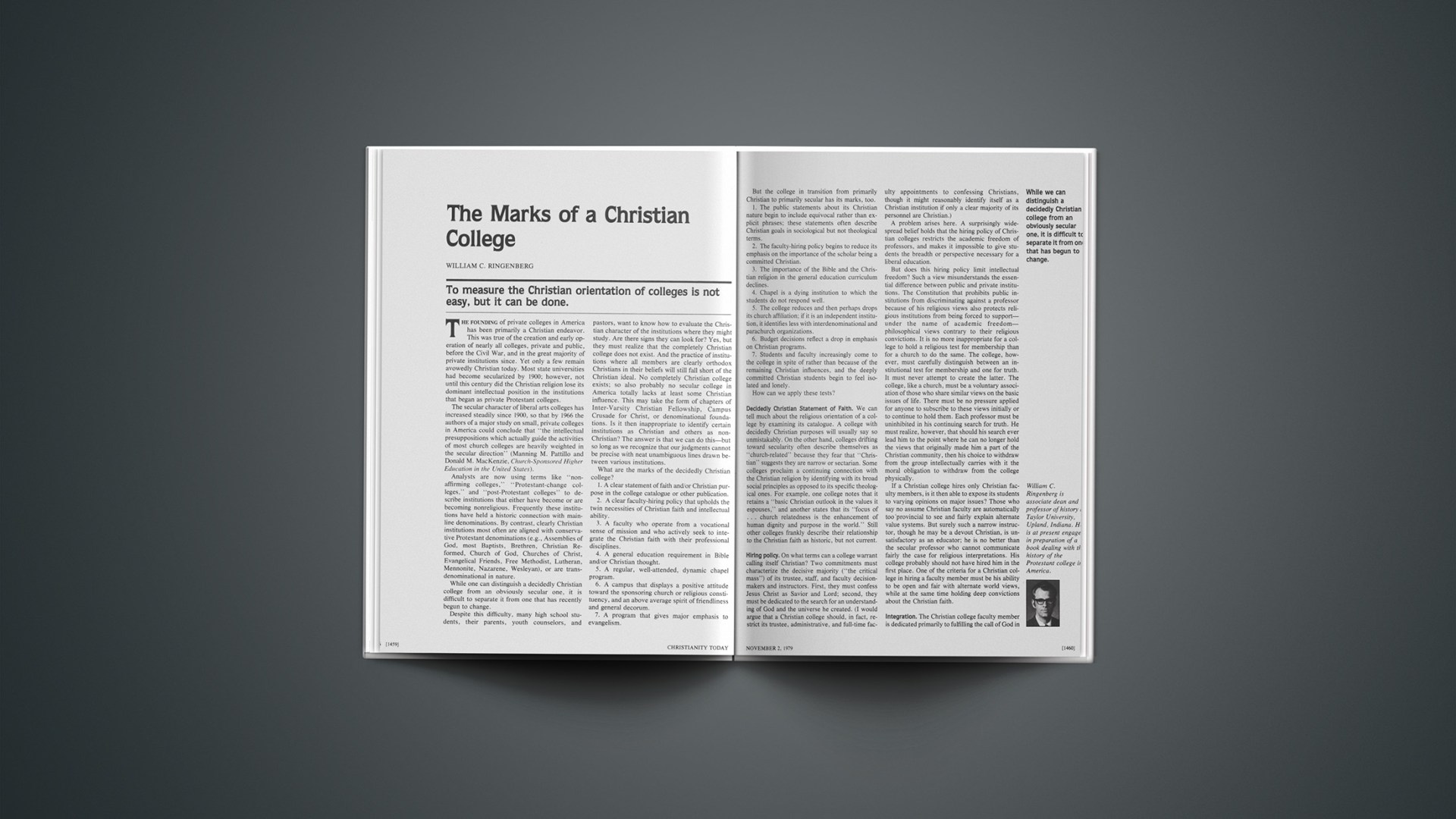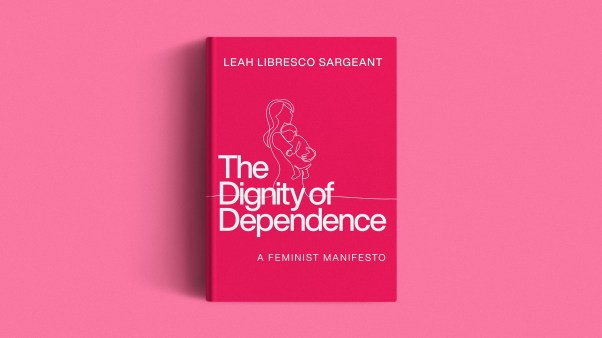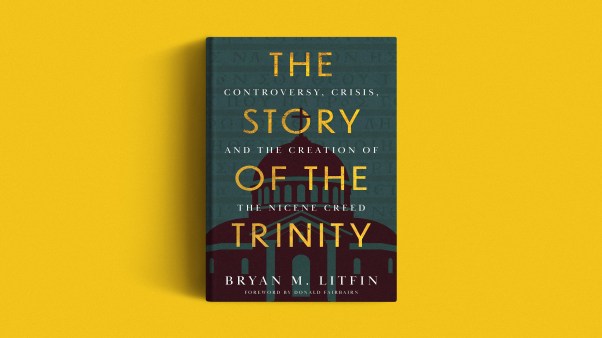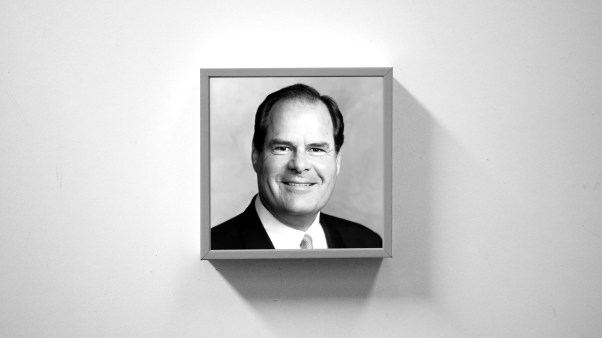The founding of private colleges in America has been primarily a Christian endeavor. This was true of the creation and early operation of nearly all colleges, private and public, before the Civil War, and in the great majority of private institutions since. Yet only a few remain avowedly Christian today. Most state universities had become secularized by 1900; however, not until this century did the Christian religion lose its dominant intellectual position in the institutions that began as private Protestant colleges.
The secular character of liberal arts colleges has increased steadily since 1900, so that by 1966 the authors of a major study on small, private colleges in America could conclude that “the intellectual presuppositions which actually guide the activities of most church colleges are heavily weighted in the secular direction” (Manning M. Pattillo and Donald M. MacKenzie, Church-Sponsored Higher Education in the United States).
Analysts are now using terms like “non-affirming colleges,” “Protestant-change colleges,” and “post-Protestant colleges” to describe institutions that either have become or are becoming nonreligious. Frequently these institutions have held a historic connection with mainline denominations. By contrast, clearly Christian institutions most often are aligned with conservative Protestant denominations (e.g., Assemblies of God, most Baptists, Brethren, Christian Reformed, Church of God, Churches of Christ, Evangelical Friends, Free Methodist, Lutheran, Mennonite, Nazarene, Wesleyan), or are transdenominational in nature.
While one can distinguish a decidedly Christian college from an obviously secular one, it is difficult to separate it from one that has recently begun to change.
Despite this difficulty, many high school students, their parents, youth counselors, and pastors, want to know how to evaluate the Christian character of the institutions where they might study. Are there signs they can look for? Yes, but they must realize that the completely Christian college does not exist. And the practice of institutions where all members are clearly orthodox Christians in their beliefs will still fall short of the Christian ideal. No completely Christian college exists; so also probably no secular college in America totally lacks at least some Christian influence. This may take the form of chapters of Inter-Varsity Christian Fellowship, Campus Crusade for Christ, or denominational foundations. Is it then inappropriate to identify certain institutions as Christian and others as non-Christian? The answer is that we can do this—but so long as we recognize that our judgments cannot be precise with neat unambiguous lines drawn between various institutions.
What are the marks of the decidedly Christian college?
1. A clear statement of faith and/or Christian purpose in the college catalogue or other publication.
2. A clear faculty-hiring policy that upholds the twin necessities of Christian faith and intellectual ability.
3. A faculty who operate from a vocational sense of mission and who actively seek to integrate the Christian faith with their professional disciplines.
4. A general education requirement in Bible and/or Christian thought.
5. A regular, well-attended, dynamic chapel program.
6. A campus that displays a positive attitude toward the sponsoring church or religious constituency, and an above average spirit of friendliness and general decorum.
7. A program that gives major emphasis to evangelism.
But the college in transition from primarily Christian to primarily secular has its marks, too.
1. The public statements about its Christian nature begin to include equivocal rather than explicit phrases; these statements often describe Christian goals in sociological but not theological terms.
2. The faculty-hiring policy begins to reduce its emphasis on the importance of the scholar being a committed Christian.
3. The importance of the Bible and the Christian religion in the general education curriculum declines.
4. Chapel is a dying institution to which the students do not respond well.
5. The college reduces and then perhaps drops its church affiliation; if it is an independent institution, it identifies less with interdenominational and parachurch organizations.
6. Budget decisions reflect a drop in emphasis on Christian programs.
7. Students and faculty increasingly come to the college in spite of rather than because of the remaining Christian influences, and the deeply committed Christian students begin to feel isolated and lonely.
How can we apply these tests?
Decidedly Christian Statement of Faith. We can tell much about the religious orientation of a college by examining its catalogue. A college with decidedly Christian purposes will usually say so unmistakably. On the other hand, colleges drifting toward secularity often describe themselves as “church-related” because they fear that “Christian” suggests they are narrow or sectarian. Some colleges proclaim a continuing connection with the Christian religion by identifying with its broad social principles as opposed to its specific theological ones. For example, one college notes that it retains a “basic Christian outlook in the values it espouses,” and another states that its “focus of … church relatedness is the enhancement of human dignity and purpose in the world.” Still other colleges frankly describe their relationship to the Christian faith as historic, but not current.
Hiring policy. On what terms can a college warrant calling itself Christian? Two commitments must characterize the decisive majority (“the critical mass”) of its trustee, staff, and faculty decision-makers and instructors. First, they must confess Jesus Christ as Savior and Lord; second, they must be dedicated to the search for an understanding of God and the universe he created. (I would argue that a Christian college should, in fact, restrict its trustee, administrative, and full-time faculty appointments to confessing Christians, though it might reasonably identify itself as a Christian institution if only a clear majority of its personnel are Christian.)
A problem arises here. A surprisingly widespread belief holds that the hiring policy of Christian colleges restricts the academic freedom of professors, and makes it impossible to give students the breadth or perspective necessary for a liberal education.
But does this hiring policy limit intellectual freedom? Such a view misunderstands the essential difference between public and private institutions. The Constitution that prohibits public institutions from discriminating against a professor because of his religious views also protects religious institutions from being forced to support—under the name of academic freedom—philosophical views contrary to their religious convictions. It is no more inappropriate for a college to hold a religious test for membership than for a church to do the same. The college, however, must carefully distinguish between an institutional test for membership and one for truth. It must never attempt to create the latter. The college, like a church, must be a voluntary association of those who share similar views on the basic issues of life. There must be no pressure applied for anyone to subscribe to these views initially or to continue to hold them. Each professor must be uninhibited in his continuing search for truth. He must realize, however, that should his search ever lead him to the point where he can no longer hold the views that originally made him a part of the Christian community, then his choice to withdraw from the group intellectually carries with it the moral obligation to withdraw from the college physically.
If a Christian college hires only Christian faculty members, is it then able to expose its students to varying opinions on major issues? Those who say no assume Christian faculty are automatically too provincial to see and fairly explain alternate value systems. But surely such a narrow instructor, though he may be a devout Christian, is unsatisfactory as an educator; he is no better than the secular professor who cannot communicate fairly the case for religious interpretations. His college probably should not have hired him in the first place. One of the criteria for a Christian college in hiring a faculty member must be his ability to be open and fair with alternate world views, while at the same time holding deep convictions about the Christian faith.
Integration. The Christian college faculty member is dedicated primarily to fulfilling the call of God in his life and only secondarily to his academic discipline; however, he strives to apply biblical teaching to his specialty. An example of the concept of a faculty member as a divinely called minister appears in the following statement by a college administrator in Michigan:
“[At our college] all of us are considered as ministers for the church, and we consider ourselves as servants of God—not merely employees.”
In the last 10 or 15 years evangelical colleges have emphasized the need to integrate faith and learning. Christian professors have always sought this, but the unique element of the last decade is the conscious, overt effort of many colleges—such as the members of the Christian College Consortium—to inspire their faculty members to work even harder to realize this goal.
The Bible in General Education. It is difficult to imagine that an institution would claim to be a Christian college and yet not have a general education requirement in biblical Christianity. It is not a satisfactory substitute for a college to allow students to meet an “area” requirement by choosing between a Bible course and a wide range of other religious and metaphysical subjects (e.g., “Living Religions of Asia,” “Patterns of Religious Experience,” and “Religion as Story”). When a curricular pattern suggests that any one theological/philosophical subject is as worthy of investigation as another, a sense of values disappears. Students quickly understand that the college no longer believes the Judeo-Christian tradition is uniquely important in understanding the meaning of the universe.
Campus Worship. The decline of required chapel frequently is one of the more visible symptoms of decay in the Christian orientation of a school. It often follows gradually after the frequent appointment of faculty who are not committed Christians. A college may say it has eliminated chapel because “we don’t want to force religion on anyone,” as though a chapel requirement is more akin to the medieval state-church system than to the college’s other requirements for graduation. What such a college is really saying, however, is, “We don’t think Christian worship is very important anymore—certainly not as important as other requirements in, say, English composition or physical education.”
In most colleges where chapel is a dying institution, the students complain that the programs lack meaning. The charge is often valid. As colleges place less emphasis on the importance of the Christian religion, it naturally follows that their officials will appropriate a lot fewer resources to assure high quality religious programming. Also as students and faculty members see an institution reducing its commitment to the uniqueness of the Christian religion, they see less reason to continue participating in religious services whose theology is increasingly relativistic.
Required chapel attendance makes sense only when the message proclaimed in the chapel is considered essential and authoritative.
College chapel is the recurring event the greatest number of students are required to attend. Does it not follow, then, that the college must make certain that the quality of chapel is exceeded by no other campus activity?
The Sponsoring Group. A close correlation exists between two factors: the campus attitude toward the sponsoring denomination, and the denomination’s degree of theological orthodoxy. For example, college-church relations tend to be much more positive with denominations that have held faithfully to their evangelical origins, as with new evangelical and fundamentalist groups. Colleges related to churches or denominations that have drifted from their heritage are often even more liberal theologically than their denominations, and as the gap between college and church widens, frequently the two reduce and then end their relationship. When this official divorce takes place, often it is merely the culminating step in a secularizing process active for many years.
Evangelism. Both the vocational plans of Christian college students and the evangelistic programs of Christian colleges have changed over the years. However, Christian colleges must not allow these shifting patterns to alter the practice of giving major emphasis to evangelism. A much smaller percentage of Christian college graduates now enter the ministry or go to the mission field than formerly. This is partly because the rapidly growing Bible institute and Bible college movement now prepares so many Christian workers. Also, young people attend Christian colleges for a broader range of purposes than training for professional Christian ministries.
The Christian college, however, must never forget that evangelism is a responsibility of all Christians, regardless of whether they are preparing for “full-time Christian work” or some other profession. One means of stimulating evangelistic interest—revivals—has become less popular on the Christian college campuses in recent years. This is not necessarily bad, however, if the colleges are able to replace them with other equally effective methods.
Central Issue. What then is the ultimate question in determining the extent to which a college is Christian? We must ask how completely do a college’s trustees, faculty, and staff believe that the supreme revelation of God to man through Christ is the central act of history, and therefore is the key to ultimate meaning in the universe.
When doubt begins to grow on this primary issue, many of the later stages in the process of secularization follow quite normally. For example, if the Christian religion is merely one of many good systems of thought, and if Jesus is only a good man, then there is no reason to hire only Christian scholars rather than good and knowledgable men of all persuasions. Nor is there reason to maintain a Bible requirement for all students instead of, say, a course in religion or values in general. Nor to commit precious college resources to maintaining a carefully planned program for campus-wide Christian worship.
The character of an institution, then, develops from its theological foundation; that foundation, however, can be eroded. It is a critical task of Christian college leaders to prevent this. Also, it is the responsibility of Christian ministers, youth leaders, and parents to assist these high school young people looking for a Christian college to identify those intellectually anchored to the Rock of Ages.
To measure the Christian orientation of colleges accurately and fairly is not easy, but it can be done. Moreover, it must be done if Christian young people are to have the best possible information in making the critical decision of where to spend what may be the last major developmental period of their lives.
G. Douglas Young is founder and president of the Institute of Holy Land Studies in Jerusalem. He has lived there since 1963.










